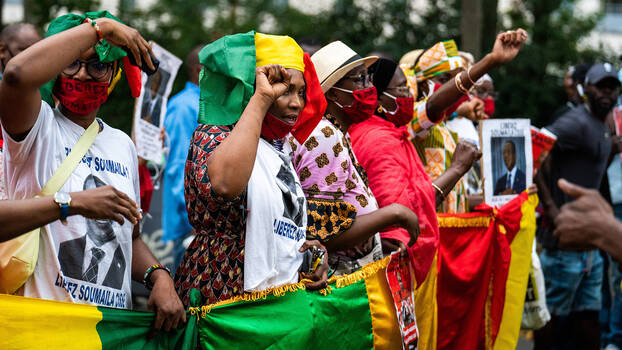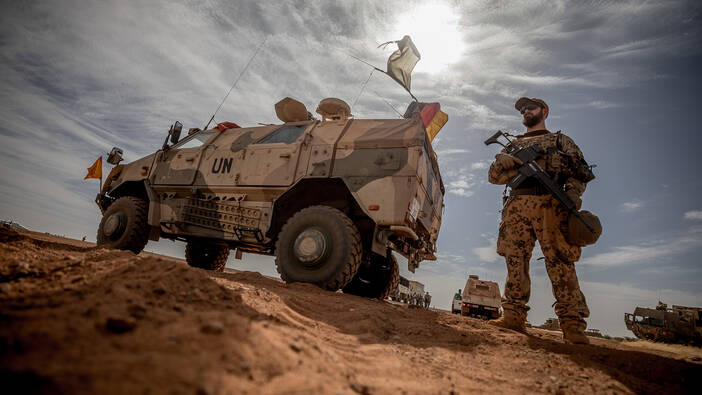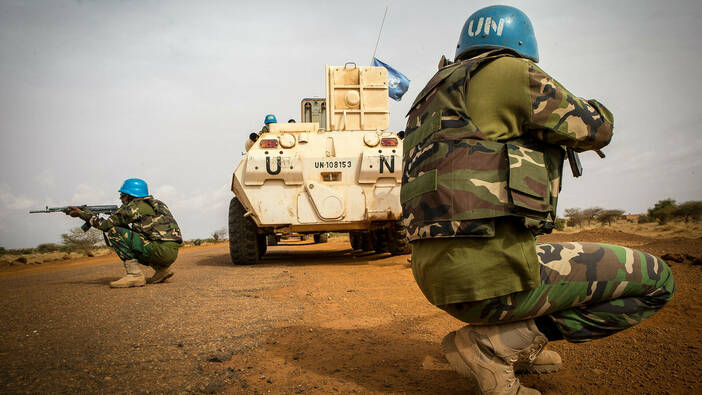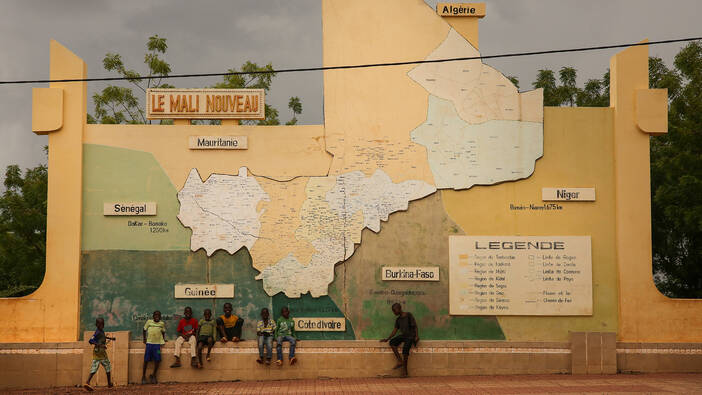
The current situation in Mali is characterized by a certain degree of confusion. In June 2020, the Mouvement du 5 Juin-Rassemblement des Forces Patriotiques (M5-RFP) began demonstrating for an end to the reign of President Ibrahim Boubacar Keïta (IBK). When the military staged a coup in August, the M5-RFP was unable to mount a coherent response: the alliances forged between the different elements of the movement shattered in the face of the leaders’ vying for power, or more precisely for the distribution of power.
Chéibane Coulibaly is the director of Mande Bukari University. He is the author of numerous books, including Crise politico-institutionelle au Mali: Essai de philosophie politique Mandingue, published in 2020.
Translated by Sam Langer and Marty Hiatt for Gegensatz Translation Collective.
M5-RFP consists of three organisations: La Coordination des mouvements, association et sympathisants (CMAS) von Imam Mahmoud Dicko, Espoir Mali Koura (EMK) and Front pour la sauvegarde de la démocratie (FSD). The struggle over the political leadership of the M5-RFP began when the wing EMK denied Mahmoud Dicko the role of political leader. Dicko, an imam, had called for the June protests, and was considered the movement’s leader. Cheick Oumar Sissoko, president of the left party Solidarité africaine pour la démocratie et l’indépendance (SADI), called Dicko the moral leader of the movement. The EMK was least capable of mobilizing activists, while also claiming to be the head of the movement as a whole. Moreover, the EMK leaders, accused by many intellectuals of being “extreme leftists”, were not able to build the compromises that would have enabled them to gradually attain their goals.
Dicko was also under an enormous amount of pressure. First from the international community, which tried to take control of the situation and endlessly repeated its fear that, with Dicko, Mali was witnessing the dawn of an “Islamist power”. Then there was the pressure applied by the Economic Community of West African States (ECOWAS) which, under the cover of a return to normal constitutional life in Mali, supported the traditional political parties that the Malian people had so strongly criticized. And finally, after the coup on 18 August, the young army officers added their share of pressure in attempting to take control of the situation. Allegedly, in the end Dicko stood down at the behest of Arab backers who are supposed to have assigned him his mission in Mali. In any case, Dicko had already begun backing down from the moment he declared that he had never called for IBK’s resignation.
Dicko’s hesitations led the youth who had made up the bulk of the demonstrators to form vigilante brigades in order to ensure that the movement’s objectives were being accomplished. The third element of the M5-RFP, the traditional political parties, favoured reinforcing these brigades. Choguel Kokala Maïga (head of the party Mouvement patriotique pour le renouveau, MPR), benefiting from his position as head of the M5-RFP’s strategic committee, directly addressed the members of the brigades, saying that henceforth the M5-RFP would regularly report back on the progress of negotiations, and that the movement would not take any course of action without the brigades’ permission.
The M5-RFP’s popular base had now been endorsed by the strategic committee, but the traditional parties were counting on using the loosely structured brigades to gain effective political control. But the brigades proved difficult to manipulate; their slogan was too radical (“the satisfaction of all demands”) in a situation requiring compromise.
At the same time, the brigades’ existence prevented the various actors from indulging in the compromises that had characterized the entire political period now coming to a close. Even the military coup was wary of the brigades, and resisted giving in too quickly to pressure from the ECOWAS, which Malians accused of wanting to reinstate the IBK regime.
But the brigades did not have a unified and independent political orientation. The pressure they put on the parties involved, including the military elements that had now taken power, could not be maintained beyond the fracturing ofthe M5-RFP and its ultimate breakup. Their disappearance in turn contributed to the collapse of the M5-RFP, whose last meeting with transitional president Bah N’Daw showed how irrelevant the movement had now become in the Malian political landscape.
What the M5-RFP focused on was the composition of the transitional authorities, rather than the transition roadmap. Only recently, Choguel called for the dissolution of the transitional parliament, the Conseil National de Transition(CNT), as well as the government—giving the impression that what interests M5-RFP leaders is obtaining posts in the state apparatus. On television, the transitional president merely smiled in response to their demands, eight months into a transition process that is scheduled to last 18 months.
More seriously still, the M5-RFP had no influence on the transition roadmap: the army quickly grasped that what ultimately counts are the demands of the ECOWAS and those of the international community—especially in relation to the Algiers Agreement, so reviled by the Malian population.
Despite protests by various organizations, the transitional government intends to hold a constitutional referendum that will adopt a constitution taking into account the measures recommended by the Algiers Agreement. At the time, I called on Germany and other friendly countries to oppose the imposition of economic sanctions against Mali in the wake of the coup. Today, the same countries should refuse to finance the organization of the constitutional referendum, because the proposed draft constitution does not in the least correspond to the desires of most Malians. This constitution is likely to be passed nevertheless, given that to date no one has been able to guarantee that elections held in Mali are free and fair.
It is clear that if the M5-RFP had continued to concentrate its efforts on the transition roadmap, the debates about a new constitution would be more inclusive. What is certain is that even if the transition manages get such a constitution through, it will be immediately called into question again once the transition is over. The old social pact which bound the communities, notably around the use of land and natural resources, has been broken (hence the proliferation of intra- and inter-communal conflicts) and a new pact is far from having been built. Under these conditions, rushing to pass a constitution that is supposed to codify the new social pact would be putting the cart before the horse.
If the transitional authorities had—in accordance with the wishes of the people—continued the struggle against corruption and misappropriation of public wealth, they would have changed the situation throughout the country. They would have cleaned up the political situation in Mali, and put an end to the illegal actions of an entire political class and its allies.
The soldiers who took power were subject to such pressure (notably economic and more specifically financial) from the ECOWAS that they gave in to the demands of an organization which ordinary people see as “a consortium of corrupt and stateless heads of state”. The army officers in power could not take the risks of lacking the means to run the state apparatus, particularly to pay the salaries of public servants. And they feared having to deal with a popular uprising, especially as large numbers of urban Malians are opposed to coups d’état.
Is Mali therefore heading for a total impasse, especially as regards threats from the M5-RFP to relaunch street demonstrations and repeated strikes by the unions? There are indeed risks, but they are due neither to the movement nor the unions. The M5-RFP today is incapable of large-scale street mobilizations: the CMAS and its charismatic leader, Mahmoud Dicko, no longer form part of this group; according to some leaders of the EMK, their movement alone is incapable of mobilizing more than two hundred people; the third element of the original M5, the FSD, mainly consisting of the traditional political parties, still lacks the trust of ordinary people.
Today the unions, especially the most powerful organization among them, the Union nationale des travailleurs de Mali (UNTM), have leaders who are aware that a transitional government does not dispose of the same financial means as a “constitutional government”. They thus know that not all of their demands can be met, but continue to place what they consider to be reasonable pressure on the government, for one thing so that some of their demands might be satisfied, and also to compel the state to show greater respect for workers by keeping its promises to them.
Mali’s problems lie deeper: a common social project is absent. There is a strong contradiction between a political class whose aim is to establish liberal democracy based on the centrality of the individual, private property, and the logic of the market, and a populace which in large part is stubborn in its affirmation of family, of a particular form of “property” that tends more towards “collective ownership” (for instance of land), and of food self-sufficiency.
This question is eminently political and Malians need to have the courage to approach it honestly, in the course of the many “dialogues” that they keep organizing. The transition could have worked, and still can work, towards assembling the conditions which would enable Malians to move beyond this very difficult stage.
The views and opinions expressed are those of the author and do not necessarily reflect the official policy or position of the Rosa-Luxemburg-Stiftung.


